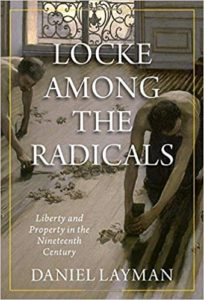
For the Independent Review, I’ve reviewed Locke Among the Radicals by Daniel Layman. It is a splendid book, which rediscovers “a coterie of nineteenth-century radical Lockeans with a penchant for anarchy and anti-capitalism”: Thomas Hodgskin (1797–1869), Lysander Spooner (1808–1887), John Bray (1809–1897) and Henry George (1839–1897). This is an unlikely lot, as these thinkers do not particularly resemble each other and are hardly considered in conjunction. But they are, in different ways, radicals who were strongly influenced by John Locke. Layman suggests that, in our usual understanding of the history of ideas, we tend to believe that Locke was unimportant in the 19th century and that he emerged again as an influence over political thinking in the second half of the 20th century.
It is quite interesting that Locke became central again for liberal thinkers after WWII. Those who fueled this Lockean renaissance were not necessarily friends or advocates of liberalism, but scholars who, like Peter Laslett or C.B. Macpherson, contributed substantially in placing Locke again at the center of the history of liberalism. Then Robert Nozick came and the influence of Anarchy, State and Utopia made the sort of natural rights classical liberalism that Locke embodied again a matter of discussion for political philosophers, and not exclusively for those more versed in the history of ideas.
I suppose it is relatively commonplace to say that Locke was not so important to understand 19th century liberalism; most such champions were Utilitarians. Layman looks for “Lockean influences” in the 19th century and finds them in radicals that foreshadowed developments that we can also acknowledge in the post-Nozick debate.

The book thus aims at correcting the view of the irrelevance of Locke in the 19th century, and it does so persuasively. Layman’s treatment of Spooner’s work is particularly noteworthy. The review is critical of the conclusions of the book when it comes to the actuality of Locke. But I cannot recommend it highly enough and I’ve learned a lot from it.


READER COMMENTS
Mark Brady
Feb 7 2021 at 6:03pm
Thank you for bringing Daniel Layman’s book to our attention. I recommend that those who are interested in this book check out the Oxford University Press website for more information.
https://global.oup.com/academic/product/locke-among-the-radicals-9780190939076?q=daniel%20layman&lang=en&cc=us#
And Amazon offers a (very truncated) look inside.
Comments are closed.